StEAm Fest!
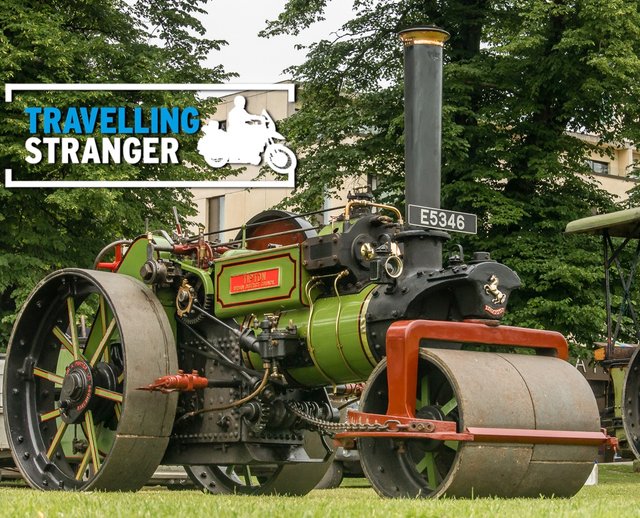 All pics by author
All pics by author
Hello my Steeming pals!
Italiano
Le giornate di giugno si sa, sono lunghe e luminose e spesso accompagnate dal primo vero caldo dell’estate ormai prossima. Ogni paese in Europa ha la proprie scadenze ed usanze per questo scorcio di fine primavera. In Italia ad esempio le scuole finiscono e c’è già chi parte per le vacanze al mare.
Nel Regno Unito invece le scuole perseverano ancora ma, in compenso nella “countryside” compaiono le primissime “village fetes” ovvero le tipiche feste di paese in stile British.
Le village fetes hanno tutte delle caratteristiche comuni. Sono eventi che coinvolgono una parte cospicua delle comunità locali ed in genere sono di durata breve: un fine settimana al massimo. Si svolgono sempre su di un “green” cioè un’area prativa curata quale quella di un parco, un campo da cricket oppure da calcio o da rugby.
English
The month of June always brings days long hours of bright light to Europe and for some it channels the first real summer heat of the year as well. Every country has its own traditions and events for this time of the year. There’s the end of the school year and the start of the holiday season for countries on the Mediterranean whilst preparations for solstice parties and festivals are in full swing in northern Scandinavia.
In the UK schools are still busy but it’s during the month of June that the very first village fetes appear in rural Britannia.
Village fetes are undoubtedly a community event and all have some striking commonalities. There seems to always be a village green or a park or even cricket pitch involved as a venue and the events themselves hardly ever last longer than a weekend or so. Many of the fete stalls are run by locals and many of these are similar all over the country.
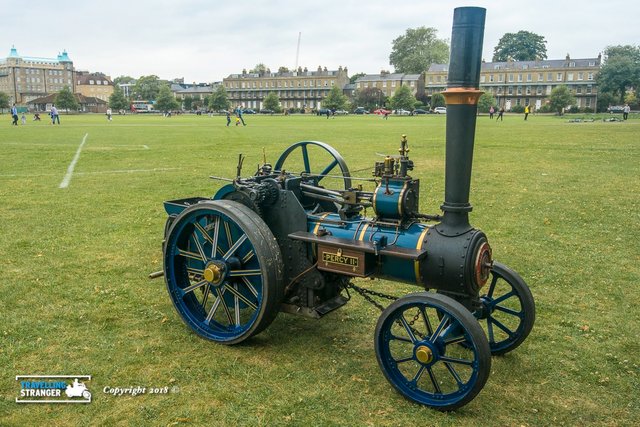 The Percy II, a fine example of steam craftsmanship
The Percy II, a fine example of steam craftsmanship
Sui green si organizzano gli “stalls” (stand, bancarelle) presso le quali si trovano immancabilmente personaggi quali “Mrs. Robertson” che in compagnia delle amiche del circolo delle bocce, per pochi pounds vende tazze di tè e fette di torta fatta in casa.
Per i più piccini immancabile è il teatrino “Punch an Judy” e magari sul prato c’è pure un “Mr. Johnson” col classico stand della ceramica. Per pochi spicci il signor Johnson elargisce vecchie palle da tennis ai paganti. Le palle verranno poi scagliate contro piatti, vasi, tazze, statuette ed altri bersagli in ceramica e terracotta disposti su scafali a qualche metro dai lanciatori. Nessun premio in palio, nessun encomio, solo risate grasse e l’ebbrezza di frantumare ceramica in mille pezzi. Ottima cura contro lo stress soprattutto quando ai bersagli si appiccicano le effigia di noti politici. Mr Johnson riscuote sempre consensi dal pubblico sia grande che piccino.
Insieme alle bancarelle non manca di certo la birra ne tantomeno il cibo in stile barbecue. Talvolta c’e’ pure musica strimpellata da cover band alle prime armi.
Caratteristica saliente di molte di queste feste di paese è la presenza di uno “Steam Rally”: una sorta di appuntamento per appassionati di un particolarissimo tipo di modellismo d’elite. È qui infatti che si radunano gli “steam engineers” che descriverei come dei maestri dell’ingegneria “fai da te”. Con pazienza ed impegno essi dedicano anni di lavoro per forgiare stantuffi, ingranaggi, pezzi per caldaie, aste e volani allo scopo di riprodurre macchine a vapore appartenenti ad un’epoca di cui nessuno ormai ha ricordi recenti.
There will always be a “Mrs Robertson” of some kind and her friends from the local bowls or crochet club selling overpriced tea, biscuits or slices of home made sugary cakes. There will unvaryingly be a Punch and Judy show for the kids to enjoy as well. No doubt there might also be a “Mr Johnson” with a “crockery smash” stall too. A pound or so might buy you some old tennis balls to through at grandmas unwanted old tea set, plates, cups mugs, vases and terracotta pots. No prizes to be won here just the fun involved in smashing up old china. No doubt a good remedy for stress enjoyed by all young and old.
Food and drink are present as well. Barbecued burgers and chicken are generally available as well as beer and wine as well. There may even be live music with a local cover band doing it’s best to keep the crowd suitably entertained.
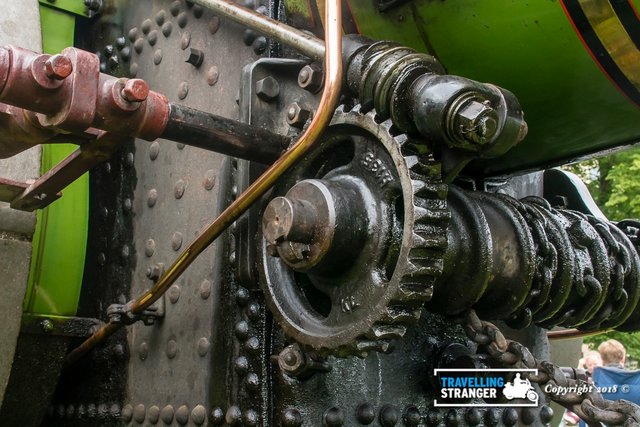
Most of all though, at some of the bigger fetes and fairs around the country, there will be a “steam rally” which can be described as a gathering of often eccentric, elite model making enthusiasts. These are no ordinary model makers at all. Rather, they are experienced craftsmen in a special league of their own.
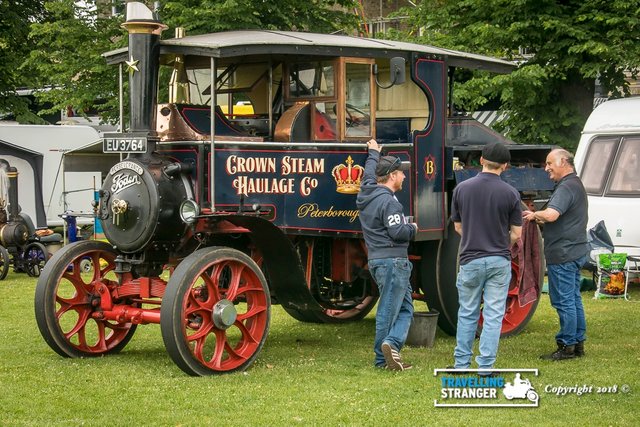 Early 20th century truck!
Early 20th century truck!
Schiacciasassi, trattori, motori statici e simili sono riprodotti con cura fedele sia in scala originale che in grandezza ridotta. Sono macchine straordinarie e decisamente affascinanti anche nelle decorazioni estetiche ricche di bronzo ed ottone.
C’è sempre un vivo interesse attorno agli “steam engines” da parte del publico. Chiaro che le macchine non sono solo esposte per essere ammirate. Esse vengono pure accese con tanto di carbone, fiamme ed acqua in caldaia. Ci sono circuiti da percorrere, bambini a cui far fare qualche giro e qualche volta ci scappa pure una gara. È curioso osservare queste ex meraviglie della tecnica muoversi lentamente in maniera goffa e pesante.
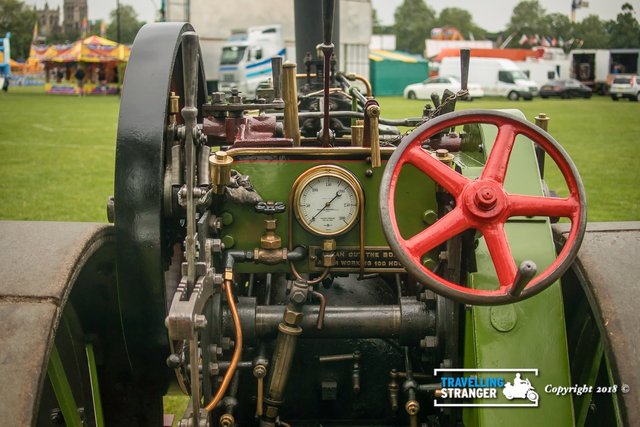 Driver's seat view
Driver's seat view
Gli steam engineers sono sempre sporchi di fuliggine ed unti di grasso ma orgogliosissimi delle loro creature. Fanno parte di un piccolo club di eccentrici che mantengono vivo il “know how” del mondo della propulsione a vapore. Chiacchierando con alcuni di loro ho capito che hanno sempre un progetto in corsa d’opera: una macchina a vapore più grande, una caldaia più efficiente o magari una vendita ad un museo all’estero. Sono personaggi d’altri tempi presi da una smania creativa ricca di nostalgia.
Può sorprendere scoprire che nel Regno Unito le locomotive a vapore vennero mantenuto in uso dal servizio ferroviario nazionale fino all’agosto del 1968. In Italia invece la trazione a vapore sopravvisse fino attorno alla metà degli anni ottanta sia pure limitatamente a ruoli di riserva e di manovra su alcuni tratti meno trafficati della nostra rete. Chissà se torneranno mai in auge.
They are “steam engineers” that spend years hidden in warehouses forging flywheels, shafts, cogs and boiler components that once assembled are all parts of a functioning replica steam machine of times long gone by. Tractors, steam rollers, static engines busses and similar are carefully built, decorated and run by these special aficionados just as they would have been back in their heyday over a hundred years ago.
There’s always keen interest from the public around the steam machines in a rally. Not only are these contraptions put on display to be admired but they are also fired up for demonstrative runs. There are circuits to ride through and children to give rides to, pictures to be taken too. The engines are truly remarkable works of engineering to behold regardless of how slowly, clumsy and oddly they move when compared to what we are used to today.
Steam engineers at work always seem to be permanently covered in soot and grease but are fiercely proud of their creations and quite rightly too. The few times I’ve exchanged a few words with any of them I got the impression that all had some major project in the works. Perhaps a bigger, better engine, a new boiler or even the sale of one of their machines to a museum or a collector of some kind. A living can still be made from steam!
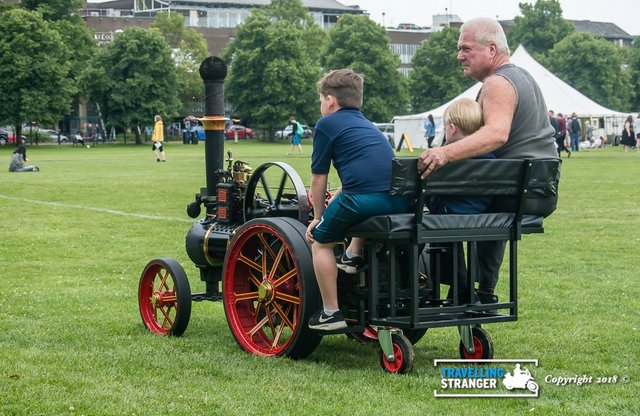 A ride for the kids
A ride for the kids
I might surprise some to find out that stream trains were used by British Rail up to 1968. The last steam engine built for the tracks in the UK was the 1960 BR Standard Class 9F 92220 Evening Star. Engines of this kind only survive in museums these days but who knows, we may see them back on track somewhere, sometime in the future.
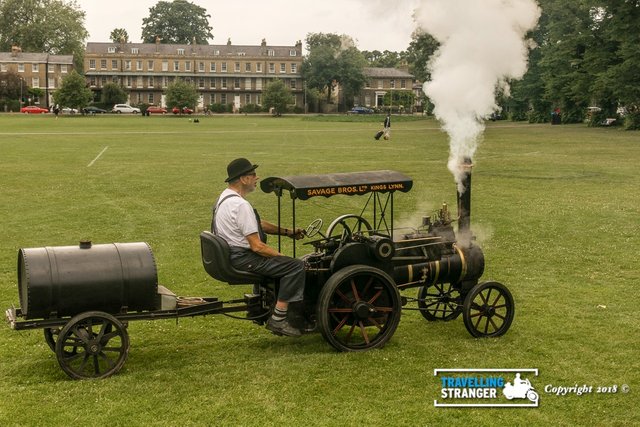 ...full steam ahead...
...full steam ahead...
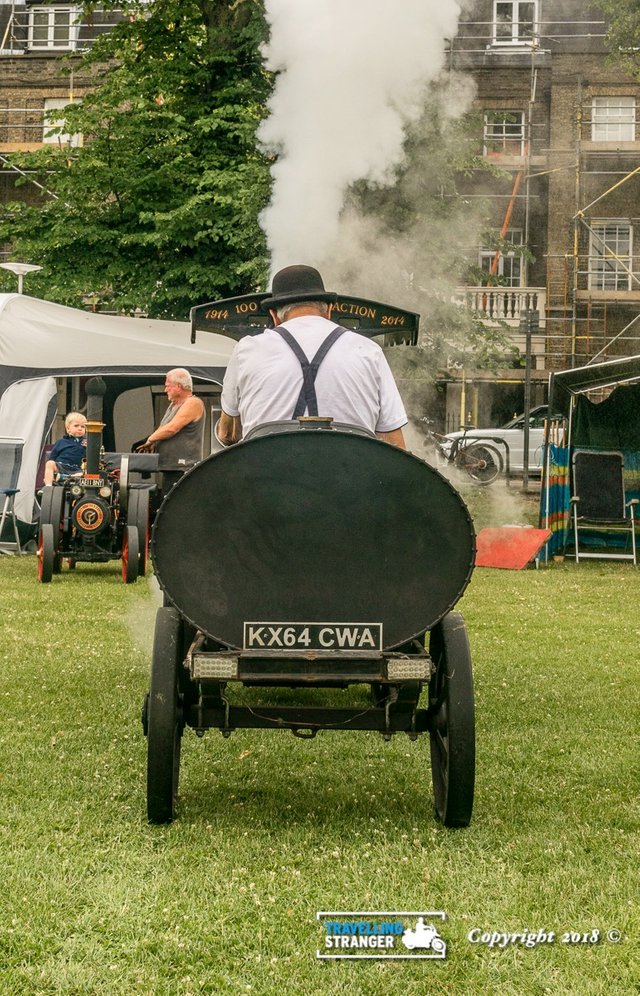 A fine example of British excentricness?
A fine example of British excentricness?
che matti.......
Si, ma sono simpatici 😀
Incredibile, sono affascinanti!
Yeah, I agree 😀